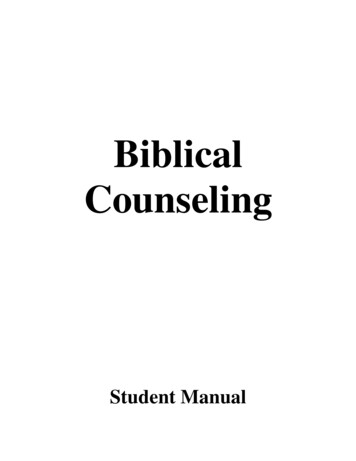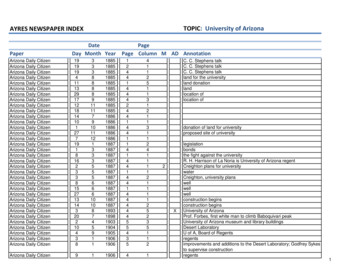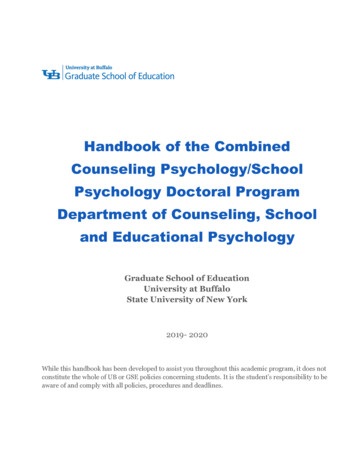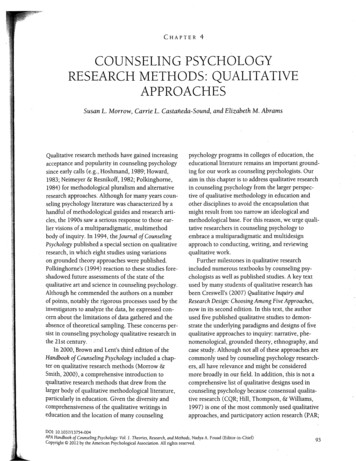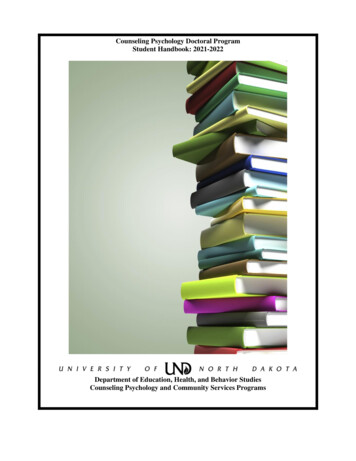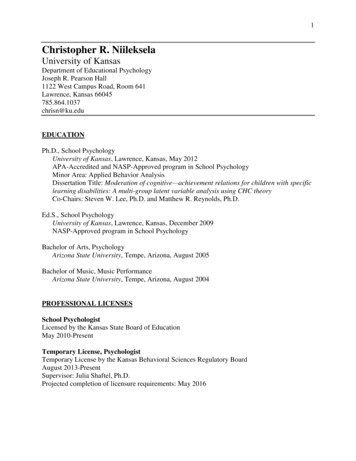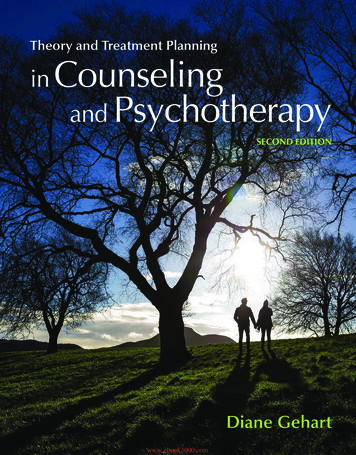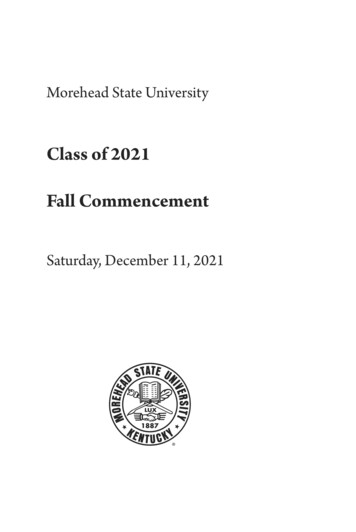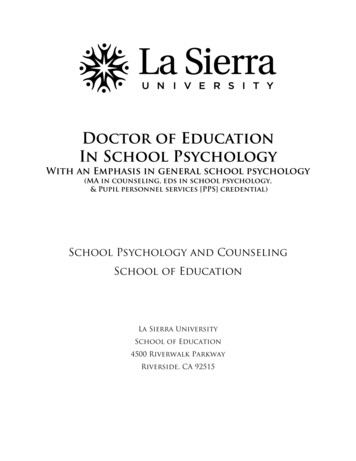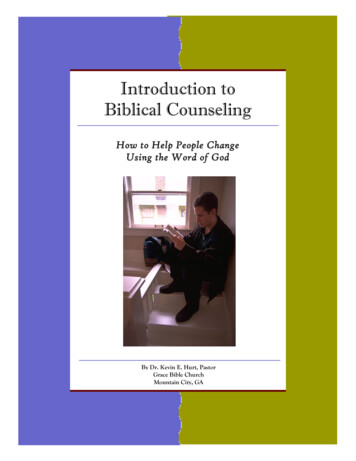
Transcription
COUNSELING PSYCHOLOGYDOCTORAL PROGRAM HANDBOOK2021-2022Revised 8/19/2021
TABLE OF CONTENTSPROGRAM OVERVIEW, INTRODUCTION, & MISSIONPROGRAM AIMSTRAINING VALUES OF THE COUNSELING PSYCHOLOGY PROGRAMADMISSIONS PROCESSPLAN OF STUDYADVISING PROCESSDOCTORAL CURRICULUMCURRICULUM PERSPECTIVESMASTER’S IN PASSINGCLINICAL TRAININGPRACTICUMFIELD PLACEMENTPRE-DOCTORAL INTERNSHIPCULMINATING EXPERIENCES AND RELATED TASKSMASTER’S THESIS/MASTER’S THESIS EQUIVALENCYCOMPREHENSIVE EXAM/PORTFOLIO ASSESSMENTDISSERTATION REQUIREMENTSPROFESSIONALISMACADEMIC INTEGRITYACADEMIC APPEALS POLICYPROFESSIONAL DEVELOPMENTPROFESSIONAL BEHAVIOR AND SOCIAL NETWORKSINDEPENDENT PRIVATE PRACTICECPY EVALUATION AND DISMISSAL POLICIESFORMAL MONITORING OF STUDENT PROGRESSRECOMMENDING DISMISSAL FROM THE PROGRAMGENERAL INFORMATIONFACULTYCOUNSELING PSYCHOLOGY PHD FREQUENTLY ASKED QUESTIONS (FAQ)APPENDIX A – COURSEWORK CHECKLISTAPPENDIX B – SECTION 600 STUDENT ACADEMIC GRIEVANCE PROCEDURESRev. 8/2021 p. 1Table of Contents
Land acknowledgement from ASU American Indian Student Support Services: “Weacknowledge that Arizona State University is built on the ancestral homelands ofAmerican Indian tribes who have inhabited this land for centuries, including the AkimelO’odham (Pima) and Pee Posh (Maricopa) peoples. We honor those who have stewardedthis land throughout generations.”PROGRAM OVERVIEWThe Counseling Psychology doctoral program is accredited by the Commission on Accreditation of theAmerican Psychological Association (APA). The program was first accredited in 1972 and hasmaintained continuous accreditation, being most recently re-accredited until 2030.Questions related to accreditation should be directed to the Commission on Accreditation:Office of Program Consultation and Accreditation:American Psychological Association750 1st Street, NE Washington, DC 20002Phone: (202) 336-5979/ E-mail: apaaccred@apa.orgWeb: www.apa.org/ed/accreditationIn accordance with Arizona State University’s (ASU) Academic Affairs Manual, the CounselingPsychology program is committed to providing an environment free of discrimination, harassment,and retaliation for the entire university community, including students, faculty members, staff, andguests. ASU expressly prohibits discrimination, harassment, and retaliation by employees, students,contractors, or agents of the university based on any protected status (i.e., race, color, religion, sex,national origin, age, disability, veteran status, sexual orientation, gender identity, and geneticinformation).INTRODUCTIONASU is classified by the Carnegie Foundation as a doctoral university with highest research activity.The doctoral program in Counseling Psychology at ASU closely mirrors this function and adheres tothe scientist-practitioner training model in preparing graduates for employment in academic and/orservice delivery settings. Although faculty interests are diverse, there is a common emphasis on usingempirical data as the basis for professional practice. In addition to the APA’s Ethical Principles ofPsychologists and Code of Conduct, the program faculty has endorsed the APA’s Guidelines onMulticultural Education, Training, Research, Practice, and Organizational Change for Psychologists,Guidelines for Psychological Practice with Girls and Women, Guidelines for Psychological Practice withTransgender and Gender Nonconforming People, and the Guidelines for Psychological Practice withLesbian, Gay, and Bisexual Clients.The Counseling Psychology program is committed to the scientist-practitioner training model. Onemanifestation of that commitment is the three complementary functions of the program’s state-ofthe-art Counselor Training Center, namely research, clinical training, and service delivery. Researchfoci include: acculturative stress, cultural socialization, health disparities, microaggressions, racismRev. 8/2021 p. 2Table of Contents
and racial attitudes, psychotherapy process and outcome, and social and personal relationships.MISSION STATEMENTThe counseling psychology program at Arizona State University (ASU) is a doctoral program in healthservice psychology that prepares students to become scientist-practitioners of counseling psychology.Graduates are license eligible as psychologists in Arizona and other states with comparable licensurerequirements. With its central focus on multicultural competence and social justice, students learn toconduct empirical research and develop clinical skills to promote the health of individuals, families,groups, and organizations in a diverse society.PROGRAM AIMSOur program seeks to train scientist-practitioners who manifest the highest standards of excellenceand cultural competency in academic and/or service delivery settings. Consequently, we provideextensive coursework and other learning opportunities in all areas relevant to the counselingpsychology profession. These include: A general psychology core consisting of the traditional substantive areas, as well as seminarsin ethics and history and systems. An empirical-foundations sequence that enables graduates to conduct independent scholarlyinquiry, as well as to evaluate aspects of professional practice. A counseling theory and method curriculum that fosters a full array of assessment andintervention skills, ensures competence in the core areas of counseling psychology such ascareer development and multicultural competencies, and encourages the acquisition ofspecialized counseling capabilities. A counseling practice curriculum consisting of practica, field placements, and internships thatpromotes the acquisition and display of counseling skills with diverse client populations andpresenting concerns. Opportunity to attain and demonstrate instructional, supervisory, and consultation skillsappropriate for counseling psychologists.Students should be aware that self-exploration and self-knowledge are prerequisites for effectivecounseling. Thus, many courses require students to engage in self-reflection.We do not attempt to pre-select the specific career paths of our students. Rather, we hope to provideour students with a sufficient critical mass of empirical and applied skills that will enable them to findsuccess and satisfaction throughout the field of counseling psychology. Some will opt to becomeresearchers and/or clinical service providers, and all will be scientist- practitioners who use empiricalevidence and a broad repertoire of obtained competencies in their careers.TRAINING VALUES OF THE COUNSELING PSYCHOLOGY PROGRAMThe Counseling Psychology program at Arizona State University subscribes, and expect all students tosubscribe, to the American Psychological Association’s (APA) Ethical Principles of Psychologists andRev. 8/2021 p. 3Table of Contents
Code of Conduct (2017). These principles apply to all aspects of professional behavior, including (butnot limited to) the practice of counseling and psychotherapy, supervision, teaching, research,consultation, and collegial relations. In addition, the program is committed to creating andmaintaining a positive training climate that (a) allows for open inquiry, free expression, and effectiveconflict resolution, and (b) promotes the understanding and affirmation of all aspects of humandiversity. The specific implications of this position are elaborated as follows:1. Freedom of expression is protected and encouraged. Students are expected to expressthemselves in a professionally responsible manner that demonstrates respect for others.Certainly, people may differ regarding whether particular communications are respectful.Students are urged to work through such difficult situations by maintaining an open mind,respect and empathy for others, and a commitment to continuing the dialogue. Whennecessary, faculty may play a facilitative role in these difficult dialogues. Unprotected forms ofexpression—threats, verbal abuse, and harassment—are not tolerated, and will be consideredgrounds for disciplinary action within the program. There are no acceptable excuses for suchbehavior; therefore, students are cautioned about what they may say as a “joke” or “in theheat of the moment.”2. An essential part of training is understanding and appreciating all aspects of human diversity,including race, ethnicity, national origin, citizenship status, language, gender identity, sexualorientation, religion, age, ability, socioeconomic status, and veteran status. Students areexpected to use their training to free themselves, as much as possible, from prejudice relatedto any of these aspects of diversity. Again, people may differ regarding what constitutesprejudice, and students are encouraged to work through these issues in the manner describedin Point 1 above.3. Students should expect to work with colleagues (e.g., peers, faculty, and clinical supervisors)and clients who are different from themselves throughout their training. Learning to workwith people from different backgrounds is a central goal of professional training. Studentswho have difficulty in working with particular types of clients must address and resolve thesedifficulties in supervision.ADMISSIONS PROCESSOur program adheres to a “mentor-mentee” model wherein students are mentored closely by afaculty advisor who shares their area of interest. Prospective students are encouraged to contactprogram faculty to discuss their research interests and program fit before applying. Please emailccp@asu.edu if you have questions.Counseling Psychology faculty take into consideration a number of factors when reviewingapplications for admission. These include: the FRK index (optional – see below), personal statement,transcripts (undergraduate and graduate, when applicable), GRE scores (optional), English proficiency(TOEFL), letters of recommendation, and quality of writing sample.Rev. 8/2021 p. 4Table of Contents
FRK INDEX (if applicable)To calculate FRK index, please use the following formula:FRK index Undergraduate GPA (or Jr/Sr GPA) ((GREverbal GREquant)/400)The GRE score in this formula is the “old” GRE score ranging from 200-800. The “new” GRE rangesfrom 130-170. You must convert the new GRE to the old GRE and plug it into the above equationusing the ETS conversion table.If you submit the optional GRE Score Report, the program will calculate your FRK index. A FRK indexof 5.5 or higher is preferred. For example, a student might obtain a 5.5 FRK index with a 3.0undergraduate GPA and GRE scores of 500 in both the verbal and quantitative areas. The FRK indexformula permits higher GRE scores to compensate for lower GPA and vice-versa.As with most doctoral programs in Counseling Psychology, admission is highly competitive. Wereceive 70-80 applications per year and accept approximately 4-6 students. Among students whoentered the program during the past three years, the average upper-division undergraduate GPA hasbeen 3.7.GRADUATE ADMISSION APPLICATIONThe Graduate Admission application is submitted online through Graduate Admissions. Applicationsare available starting September 1. It is the applicant’s responsibility to peruse the applicationinformation and not overlook requirements that delay processing the application. Applicants areresponsible for ensuring that their files are complete.SUPPLEMENTAL MATERIALS REQUIRED BY THE COUNSELING PSYCHOLOGY PROGRAMThe following materials are required by the program and are to be submitted online.Please upload the following to your application: A completed Biographical Information Form. A Curriculum Vitae (CV) documenting work and research experience. Please include:o Education historyo Research experience (including presentations and publications)o Relevant clinically-oriented experienceso Honors, awards, and professional affiliationso If applicable: Leadership experience Teaching experience Specialized training A personal statement, no longer than 2 pages (single-spaced, roughly 600-800 words), thataddresses your professional goals, preparation for doctoral training, and reasons for pursuingRev. 8/2021 p. 5Table of Contents
a doctorate in counseling psychology. Additionally, please describe your research interestsand how these fit with both ASU’s counseling psychology program and potential facultyadvisor(s). We recommend that applicants contact at least one of the faculty with whomthey are interested in working prior to submitting the application.An example of your expository writing (e.g., conference paper, research manuscript, literaturereview, or a paper you have completed for a course) not to exceed 1 MB. In evaluating thesesamples, we look for evidence of scholarship and research potential as well as writing ability.For documents exceeding 1 MB, please select the excerpt that best highlights yourscholarship, research potential, and writing ability.THREE LETTERS OF RECOMMENDATIONAs part of the online application, applicants are asked to provide the names and email addressesfor each of their recommenders so that ASU can contact them directly to solicit letters ofrecommendation. As part of the application process, you will be asked if you do or do not waiveyour right to review the letter of recommendation sent on your behalf. Each recommender will beinformed of your decision and asked to submit their letter of recommendation electronically toASU. We prefer that two of these letters be from persons familiar with your academic work,unless you have been away from school for many years. It is in your best interests to request thatthese letters address, in a detailed way, your promise as a scientist-practitioner, career goals, andinterpersonal competence. Please remind recommenders that they will upload directly throughthe ASU electronic system.GRE SCORE REPORT (OPTIONAL)The GRE General Test is not required. However, if you choose to submit GRE scores, please sendseparately to ASU Graduate College. Use University Code 4007 for submitting GRE. There is nodepartment code. If a department code is requested, use 0000. GRE scores must be taken withinfive years of the start date of the semester to which the student applies. Therefore, test resultsolder than September 1, 2016 are not considered valid for the 2022-2023 admission cycle.OFFICIAL TRANSCRIPTSSend separately to ASU Graduate Admissions. ASU accepts unofficial transcripts as part of theapplication. This is the only way we will accept unofficial transcripts. Emailed transcripts are notacceptable. If you are admitted to the university, you will be required to send official transcriptsto the university. Official transcripts are original academic credentials issued by the registrar ofthe institution attended, bearing the original raised or colored seal of the institution and thesignature of your institution's registrar, academic official or recognized international organization.If you attended ASU, you do not need to request ASU transcripts to be sent.APPLIATION PROCEDURESThe Counseling Psychology program admits students once a year to begin the program in the fallsemester. The application deadline is December 1.Rev. 8/2021 p. 6Table of Contents
To apply to the program, applicants must submit both the Graduate Admission application andthe materials required by the Counseling Psychology program as directed in this section.Inquiries may be sent to ccp@asu.edu.All of your application materials must be submitted by December 1 to ensure consideration foradmission the following fall semester. Keep in mind that processing takes time, so plan to take theoptional GRE (and English proficiency exam if needed) well in advance of the deadline. It is theapplicant’s responsibility to make sure that all required materials are sent to the correct officesearly enough to be received by the deadline. The faculty will not consider incomplete or lateapplications.Soon after the application deadline, the faculty identifies a pool of the most promising applicantsfor further evaluation. Finalists will be asked to participate in an in-person interview, typically heldin early to mid-February. In cases where a personal interview causes undue hardship, aSkype/Zoom interview may be substituted.The program issues admissions offers shortly after interview day. In some cases, students areoffered a place on our alternate list. Students offered admission have until April 15 to notify theprogram in writing of their decision to accept the offer of admission or not.Applicants applying from ASU’s Master of Counseling program are required to have passed theirthesis proposal successfully before submitting their application (i.e., December 1). The thesis mustbe defended successfully prior to entry into the doctoral program.PLAN OF STUDY (iPOS)The Plan of Study specifies the requirements that students must complete for their degree and issubmitted and revised electronically via the interactive Plan of Study system (iPOS) by the timethey have enrolled in 50% of the minimum credit hours required towards their degree program(typically the end of second year of program). The iPOS must be approved by the student’sadvisor, the faculty head, and ASU Graduate College. Once approved, the iPOS becomes acontract between the University and the student that guides the student in completing degreerequirements. Refer to Graduate College guide on how to submit your plan of study.All work toward the PhD degree must be completed within 10 consecutive years. The 10 yearsbegins with the semester and year of admission to the program. Graduate courses taken prior toadmission that are to be included on the iPOS must have been completed with three years of thesemester and year of admission to the program.Prior to completing the electronic iPOS, the student should print and complete a CPY CourseworkChecklist and submit it to the advisor and then the faculty head for signatures. After the completeCPY Coursework Checklist is received, the student will receive an email from the programcoordinator to submit the electronic iPOS. It may be helpful to retain a copy of your complete CPYRev. 8/2021 p. 7Table of Contents
Coursework Checklist.Once a student’s official iPOS has been approved, course changes and changes in the committeeare submitted electronically via the iPOS. Any changes must be approved by the advisor, thefaculty head, and Graduate College. Students must have an approved iPOS prior to submittingComprehensive Examination Portfolio. Per program policy, “B-” is the minimum grade permittedon a student’s iPOS. If a student earns less than a B- in any course, they must retake the courseor its equivalent.A student must achieve a 3.0 grade point average (GPA) on all three GPAs (iPOS GPA, OverallGraduate GPA, and Cumulative GPA) to maintain satisfactory academic progress and graduate. If a3.0 GPA is not maintained, the student will be placed on academic probation. The student mustwork with her/his advisor to make meaningful progress toward meeting University and programrequirements. Please see Graduate College Policy and Procedures for greater detail.COURSE SUBSTITUTIONStudents who have taken relevant graduate coursework at other universities, which may satisfy aprogram course requirement, could petition the faculty to waive the ASU requirement in favor ofthe previous coursework.For each course, the student should complete a Petition for Couse Substitution form and attacheda copy of the course syllabus along with any other materials (e.g., reading list, exams, and soforth) that reflect the nature of the course. The student presents the petition to the advisor, whomakes an initial determination of potential course equivalence. If the advisor approves, thepetition is forwarded to the relevant course instructor. If the petition is approved, the facultyhead signs the form, and places a copy in the student’s file.The student is required to submit these courses on their iPOS. No more than 30 hours of previouscoursework may be included on the iPOS.APPLYING CREDITS FROM A PREVIOUS GRADUATE DEGREE (BLANKET 30-CREDITS)Pending Faculty and Graduate College approval, students may apply up to 30 credit hours fromtheir previously earned
The counseling psychology program at Arizona State University (ASU) is a doctoral program in health service psychology that prepares students to become scientist-practitioners of counseling psychology. Graduates are license eligible as psychologists in Arizona and other states with comparable licensure requirements.
